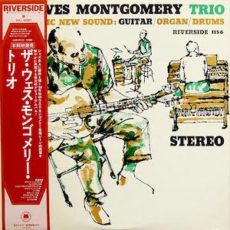
Requisites
The Wes Montgomery Trio | By Eddie Carter
“It wouldn’t be easy,” I thought to myself. Other reviewers have been crafty, cunning, and just as resourceful when writing about Wes Montgomery. “What could I say, that hasn’t already been said about one of the true innovators on the guitar?” Staring at the blank page and flashing pointer on the computer screen, I anxiously awaited an answer that never came. I took one of my favorite albums down from the shelf to listen to after writing a review, placed the record on the turntable, and began to listen. The Wes Montgomery Trio (Riverside RLP 12-310/RLP 1156) was recorded and released during that magical year of 1959 shortly after he relocated from Indianapolis, Indiana to New York City. The other members of his trio are Melvin Rhyme on guitar and Paul Parker on drums. My copy used in this report is the 1975 Riverside Original Recording Series Japanese Stereo reissue (SMJ-6080) by Victor Musical Industries, Inc.
Side One opens with one of the greatest jazz standards ever recorded, ‘Round Midnight by Thelonious Monk, Cootie Williams, and Bernie Hanighen. The trio begins with an elegantly tender introduction by Wes that flows softly into a graceful theme with Melvin and Paul trailing him ever so gently. Montgomery is the only soloist and gives a mesmerizing interpretation with the delicacy of fine porcelain figurines preceding the ensemble’s heartwarming finale. Yesterdays by Jerome Kern and Otto Harbach was an instant hit after the Broadway musical, Roberta (1933), and remains an enduring standard to this day. The trio starts with a beautifully constructed, bluesy melody. The guitarist takes the reins again for the song’s only interpretation and unfolds an infectious performance that’ll have the listener snapping their fingers and tapping their toes.
The End of a Love Affair is from the pen of Edward C. Redding and was written in 1950. It’s a marvelous song that hasn’t been over-recorded. Wes would revisit it a few years later on Goin’ Out of My Head (1966) backed by The Oliver Nelson Orchestra. The group’s rendition is uptempo with Wes in front on the melody, then making use of his octaves and chords for an effervescent first solo. Melvin dances over the pedals on the next reading leading to the exit. Benny Golson wrote Whisper Not in 1956 while he was with The Dizzy Gillespie Big Band. It’s one of his most recorded compositions and the trio starts with a warm and mellow theme. Wes starts the soloing at a low glow and Melvin adds a modest comment before the close. Ecorah by Horace Silver is also taken at midtempo, and one can’t help but marvel at the trio’s collective improvisation during the first and final choruses.
The inspiration for Satin Doll by Duke Ellington, Billy Strayhorn, and Johnny Mercer comes from a famous black stripper who used the song’s title as her stage name. The trio pays homage to the standard with a happy theme and closing chorus that’s sure to put a smile on your face with its catchy beat. Melvin shows off a wonderful articulation on the first reading, followed by Wes who keeps things swinging with some relaxed cooking on the closer. Missle Blues, the first of two tunes by Montgomery, is named after the Indianapolis club he played in. This mid-tempo original begins with a compelling swing that the ensemble states proficiently in the melody. Melvin and Wes are the featured soloists and the organist opens with a velvety smooth interpretation. Wes strolls into the closing performance at a casual flow punctuated by Paul’s brushwork.
Too Late Now by Burton Lane and Alan Jay Lerner is a very lovely standard beginning with a collective, wistful opening chorus. Montgomery refreshes this chestnut with a breathtaking lead solo tinged with melancholy. Melvin expresses a remorseful answer to the guitarist ahead of the trio’s elegant closing thoughts culminating with a delicate climax. Wes’ Jingles ends the album allowing each member solo space beginning with Rhyme who cruises happily on the melody and first solo. Wes gets into a swinging groove on the second statement, and Paul has a quick exchange with Melvin and Wes leading to the reprise and finale. Jack Higgins engineered the original recording and Victor’s remastering of the tapes is nearly perfect. The sound quality is excellent, but on Jingles, both the guitar and organ are miked too strongly and there’s a bit of harshness on both solos and the out-chorus.
In fairness to Victor, I think this miking error may have happened during the original recording. That issue aside, the rest of the album’s sound is superb and worth auditioning for a spot in your jazz library. Wes Montgomery influenced countless guitarists with his creativity, innovation, and outstanding technique. Many have paid homage to him with original songs and tribute albums and whether working with big bands, small groups, or strings, his playing showed he could converse musically in any setting. He passed away from a heart attack on June 15, 1968. If you’re a fan of Wes Montgomery and enjoy jazz guitar, The Wes Montgomery Trio is a great album for any enthusiast and perfect for listening any time of the day or night!
~ Dizzy Gillespie and His Orchestra (Fanfare N 46 146); Goin’ Out of My Head (Verve Records V-8642/V6-8642) – Source: Discogs.com ~ Dizzy Gillespie and His Orchestra – Source: JazzDisco.org ~ ‘Round Midnight, Yesterdays, The End of a Love Affair, Whisper Not, Satin Doll, Too Late Now – Source: JazzStandards.com ~ Wes Montgomery – Source: Wikipedia.org © 2021 by Edward Thomas Carter
More Posts: choice,classic,collectible,collector,guitar,history,instrumental,jazz,music


